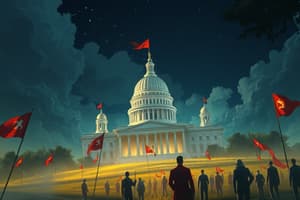Podcast
Questions and Answers
What is a characteristic of authoritarian states?
What is a characteristic of authoritarian states?
- They promote free and fair elections.
- They restrict political pluralism. (correct)
- They allow for multiple political parties.
- They encourage civic participation.
The Great Leap Forward was a policy implemented by Mikhail Gorbachev in the Soviet Union.
The Great Leap Forward was a policy implemented by Mikhail Gorbachev in the Soviet Union.
False (B)
What are two major impacts of globalization on economic issues?
What are two major impacts of globalization on economic issues?
Increased trade and economic interdependence.
Article 9 of the Japanese constitution renounces _____ as a means of settling international disputes.
Article 9 of the Japanese constitution renounces _____ as a means of settling international disputes.
Match the following terms with their definitions:
Match the following terms with their definitions:
Which of the following policies is associated with globalization's negative impact?
Which of the following policies is associated with globalization's negative impact?
The 'Clash of Globalizations' is an article discussing the harmonization of global cultures.
The 'Clash of Globalizations' is an article discussing the harmonization of global cultures.
What is one proposed action that states can take to improve the situation surrounding globalization?
What is one proposed action that states can take to improve the situation surrounding globalization?
Flashcards
Article 9 of the Japanese Constitution
Article 9 of the Japanese Constitution
Article 9 of the Japanese Constitution renounces war as a sovereign right of the nation and prohibits the maintenance of armed forces. It also prohibits the use of force as a means of settling international disputes.
Authoritarian states
Authoritarian states
Authoritarian states are characterized by strong centralized power, limited political participation, and suppression of dissent. They often feature a single dominant political party, control over the media, and restrictions on civil liberties.
Totalitarian states
Totalitarian states
Totalitarian states exert complete control over all aspects of society, including the economy, education, culture, and the lives of individuals. They are characterized by a single-party system, a highly centralized and oppressive state apparatus, and a systematic suppression of any opposition.
Ideas of communism (terms of communism)
Ideas of communism (terms of communism)
Signup and view all the flashcards
Policies implemented by Mikhail Gorbachev
Policies implemented by Mikhail Gorbachev
Signup and view all the flashcards
The Great Leap Forward (China)
The Great Leap Forward (China)
Signup and view all the flashcards
The Great Cultural Revolution (China)
The Great Cultural Revolution (China)
Signup and view all the flashcards
Economic, social, and political globalization
Economic, social, and political globalization
Signup and view all the flashcards
Study Notes
Part I: Important Words and Concepts
- Article 9 of the Japanese constitution: A significant article in Japan's constitution, likely pertaining to its pacifist stance and limitations on military activities.
- Authoritarian states: Countries governed by a single leader or group, with limited individual freedoms and often suppressing dissent.
- Totalitarian states: Highly controlled states, where the government dictates all aspects of life, often using oppression and violence to enforce its principles.
- Communism (concepts): Philosophical and political ideologies emphasizing the abolishment of private property, collective ownership, and the eventual classless society.
- Mikhail Gorbachev's policies: Specifically, the policies of the Soviet leader seeking to reform the communist system (perestroika and glasnost).
- The Great Leap Forward (China): A Chinese economic and social campaign that aimed to rapidly transform the country into a communist society, potentially leading to economic issues.
- The Great Cultural Revolution (China): A Chinese political upheaval aiming to purge capitalist, traditional and non-communist elements from Chinese society, likely led to societal disruption.
- Economic, social, and political globalization: Processes integrating the world's economies, societies, and political systems on a global scale.
- Institutional, ideational, and individual explanations for political violence: Varying theories about causes of political violence, encompassing the roles of political and social institutions, underlying ideologies, and the actions of particular individuals.
Part II: Article Main Points
- Putnam, "Turning In, Turning Out": Focuses on the decline of social capital (shared values and civic participation) in America.
- Von Soest and Grauvogel, "Identity, Procedures and Performance": Discusses how authoritarian regimes legitimize their rule.
- Fish, "Islam and Authoritarianism": Examines the relationship between Islam and authoritarianism.
- Bunce, "Rethinking Recent Democratization": Offers insights into democratization processes, especially in post-communist countries.
- Gat, "The Return of Authoritarian Great Powers": Analyzes the resurfacing of authoritarian powers on the global stage.
- Rowen, Henry, "When Will the Chinese People Be Free?": Investigates the challenges to freedom in China.
- Hoffman, "Clash of Globalizations": Examines the conflicts and contradictions in different approaches to globalization.
- Collier and Gunning, "Why Has Africa Grown Slowly?": Analyzes the slow economic growth in Africa.
- Margalit and Buruma, "Occidentalism": Analyzes perspectives on the West (the "Occident").
Studying That Suits You
Use AI to generate personalized quizzes and flashcards to suit your learning preferences.





